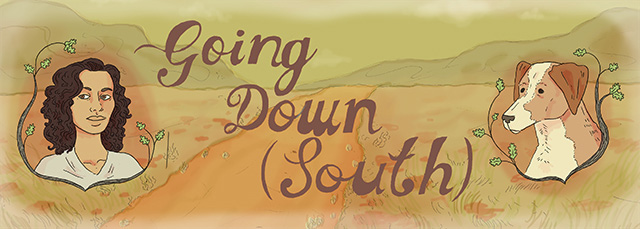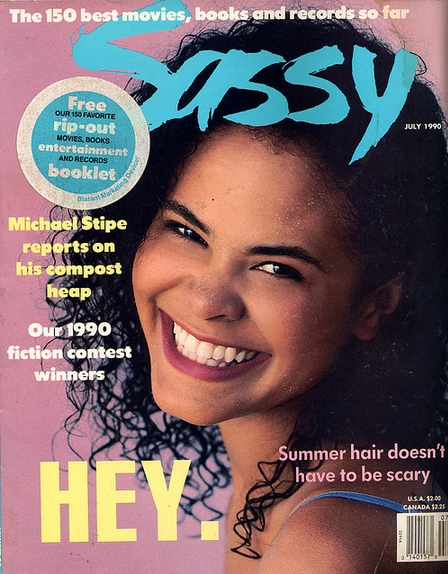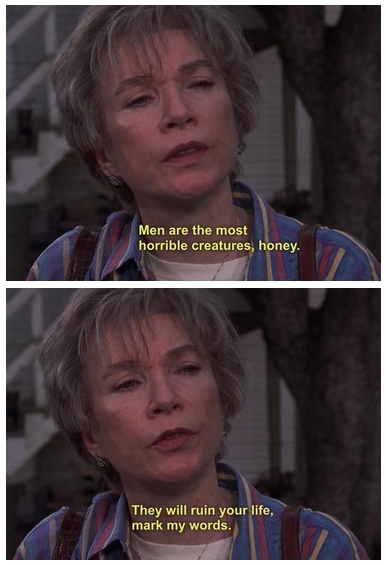Going Down (South) is a regular column about y’all being a gender neutral pronoun, how red states are actually more of a purplish color, boiled peanuts, and the trials and tribulations of being a rural homo — with an emphasis on the tribbing.

Header by Rosa Middleton
If I had my say, the award for Best Comeback of 2012 would not be bestowed upon the new gender-neutral Easy Bake Oven or even the nightmarish Furby redux. And despite being in mad, masochistic lesbian love with every track on The Idler Wheel, the title wouldn’t even go to Fiona Apple.
Nope.
It would go to sass.

Aside from being the namesake of one of Autostraddle’s favorite magazines, sass is in my blood, as is the case for many Southerners. From “bless your heart” to “kiss my grits,” we’ll argue that sass never went out of fashion down here. In our minds, everyone’s finally catching up to speed with us and not the other way around.
You might be asking: What the hell is sass, anyway? Who has it? How do I get it? Do I even want to get it? Should I be getting vaccinated against it instead?
Sass’ origin is much easier to pin down than its definition. Dating back to the early 1800s, the term is a fortunate bastardization of the Brit English word “saucy.” In the saucy-versus-sassy debate, I am a huge proponent of “sassy.” The notion of telling someone I’ve had just about enough of your sauce just sounds nasty.

While sass is typically associated with the feminine and the flamboyant, this isn’t always the case. It has more to do with semantics than aesthetics. Sass transcends appearances, so much that the sassiest of comments have been known to fly out of the most reserved mouths. While “bitch please” eyes and Z-snaps are frequently associated with it, sass is purely linguistic. It’s about rolling provocative words off of the red carpet of your tongue at the precisely right moment, aimed at the precisely right person. A matter-of-fact hand on a hip might drive a point home, but ultimately it’s all about the mouth (yes, I went there).
Without the whipsmart, occasionally self-deprecatory comebacks that are so unique to them, Dolly Parton would just be another country singer in a skintight dress; and NeNe Leakes, a yawnable reality teevee star. The term “smartmouth” is often interchanged with “sassy,” and for good reason: Sass requires a certain amount of interpersonal and linguistic intelligence. Quality sassy comebacks tend to be quick, nonchalant, and completely unanticipated.

Sass is a gumbo of varied literary devices, from double entendre to irony to assonance and maybe a hyperbole or two thrown in for good measure. A sassy remark might be one sentence long or three; the recipe varies from occasion to occasion. A new spin on an old saying may be used, or the dish could wind up containing an expletive or two (good sass should be able to stand on its own without relying upon a dash of profanity to enhance its flavor, however). Sass might sound repulsive in theory, but it always smells and tastes nothing short of amazing in person.
One of the reasons I think Southerners are so darned good at sass is because most of us have taken a prerequisite course in hospitality. If you’re gonna sass, kindness, or at least the illusion of it, is a must. Southern folks are well-aware that a sassy remark coming from an accommodating person with a very long fuse is more effective than one coming from a person who explodes in anger on a daily basis. This is why my own Mama was able to call me earlier this summer and sigh despairingly, “I was afraid you were gonna want to be a writer when you were three years old and rhymed ‘duck’ with ‘f*ck.’”

Sass is deliberately offensive, yes, but never abusive. However, the historical consequences for being sassy have been anything but, particularly if one happened to be a person of color and living in the South.
While the harshest punishment I’ve ever received for sassing was a half-hearted threat of having my mouth washed out with soap when I was five, it wasn’t that long ago that keepin’ it sassy could get you killed. The scene in which Sofia is thrown in jail for “sassing a white woman” in Alice Walker’s The Color Purple is not an exaggeration. Tuskegee University records show that, between the years of 1882 and 1952, the charge of “sassing a white individual” resulted in numerous lynchings in Alabama, Arkansas, Florida, Georgia, Louisiana, Mississippi, South Carolina, Tennessee, Texas, and Kentucky.
As someone whose existence is an ongoing, often stumbling exploration of what it means to be biracial, my sass takes on an entirely new meaning because of my regional history; my sass becomes political. I mouth off with the acute awareness that words coming out of me, no matter how cleverly crafted, might’ve been silenced by death half a century ago. The same holds true for outspoken female-bodied and queer folks who would’ve been accused of talking back, impudence, or even insanity in a previous era.

I don’t think it’s any coincidence that the sass masters in my life have been racial, gender, and sexual minorities. Sass is a nod to those ran off at the mouth before you did, often to grave consequence. Sass is the language of the oppressed and the downtrodden; those who have had it up to the gills and aren’t going to take it anymore. Sass is a way of spitting fire when all you really want to do is fade to embers. It’s both fine art and survival skill, wrapped up in a four-letter word which isn’t one.
If you happen to be a minority, sass isn’t just sass.
It’s sasstivism.








Comments
Thank you for this fascinating article.
I have nothing to add because this is perfect but <3
Day = made.
I’ve been thinking lately that sass, or the art of verbal head-thumping, is culturally descended partially from the glam dicenn…the bardic curse/satire that could raise boils on the face of its intended target. Always aimed at those in power who misused it (otherwise, what would be the point?) A put-down aimed at someone who has less power than you isn’t sass…it’s just bullying. But aimed at someone who has more power than you, it’s a form of rebellion. As you say…sasstivism.
Is dry sarcasm the Masshole’s sass?
i was just thinking this! what is the northern equivalent of sass?
pretty sure you NEED to have a sarcastic and dry wit to deal with the winters up here. when you’re struggling to unlock the door to your car in three feet of snow at 9 below zero, there is nothing to say but “well, this is just fan-fucking-tastic.”
fonseca, please continue to be FLAWLESS and lemme know when you get yr postcard, gurl. your orgasm postcard is hanging on my fridge right now.
Yes!
Sass is the Southern sarcasm.
You are perfect.
This is too perfect and just a further reminder of why I miss the South. I never though I would until I left. And your articles aren’t helping.
I have never been prouder of being considered the sass master among my my friends or for having a long history of being grounded as a child for sassing. I didn’t realize it was such a southern thing! I thought everyone knew about sass.
Seriously, though, these articles about the south are some of my very favorites. Keep writing, please!
Ouiser Boudreaux is pretty much the person I model my future life after.
Double hand snaps for this article!
Sass has been apart of my growing experience in Georgia– whether as a defense mechanism or just hanging with friends, my sassy attitude and of others has always brought me a little comfort~
When I was in 6th grade, this girl in my class cornered me in art class and asked something along the lines of “why I wore the same hoodie day after day, eeew that’s gross hahaha.”I just looked at her and deadpanned “Clothes are meant to be worn.” I wish I could say that kept her from fucking with me throughout middle school, but at least it shut her up.
Sasstivism is pretty much how I’ve survived, well, life since I could talk. I’ve had the shit beaten out of me for sassing, I’ve been kicked out of my house for sassing, and got in trouble with way more authority figured than I care to remember for sassing. But the sassing has kept me alive, kept me whole, even if I don’t say any of it out loud. It’s a nice way of reminding other people that they don’t own me. It’s a nice way of reminding myself that they don’t own me, too.
Thank you for this article, Fonseca. It reminded me of the importance of sass at a time in my life where I really needed to be reminded of it. Also, the word sasstivism is pretty much perfect.
Sass is my favorite verb.
Sass is definitely not just a southern thing.
This column sets my heart aflutter.
Yeah, I’ve always equated sass to be an attitude that employs methods of satire, irony and sarcasm. And it is definitely not a Southern thing. Having a nice drawl (extension of your tone and vowels, not an accent) is also a must.
Loved this article!
Thanks for this! The sass I had in me growing up was always something to be quashed hard by parents…. “don’t you talk back” til I stopped what I was doing (including trying to stand up for myself, I guess). This article made me think it’s more than time to get my sass back!